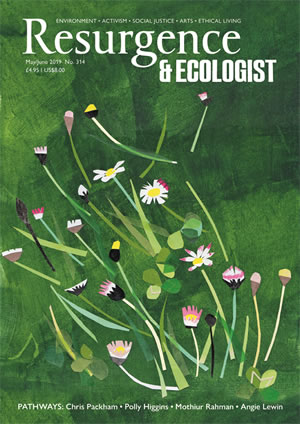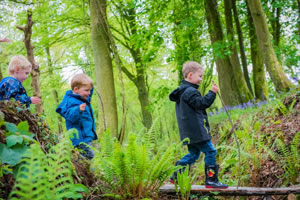As a society we have become disconnected from the natural world. We see Nature as some sort of middle-class lifestyle add-on rather than something we are intrinsically part of. Somehow we forget there is no health and wellbeing on a dead planet. This has led to a collective indifference to the catastrophic demise of our natural environment. We think the world is so large we can never run out of resources. Indeed our entire economic model is based on converting more of Nature into money to keep alive the fairy tale of infinite growth.
Each year in the UK, 1 in 4 of the adult population experiences a mental health problem, over the last 25 years rates of depression and anxiety in teenagers have increased by 70%, and 62% of adults and 35% of children aged 2–15 are overweight. It is clear that despite all our material wealth we are not happy.
Our current medical approach to health care has its limitations. We invest most of our resources in frontline interventions for established disease and illness. We have taught society to expect a medication or intervention for any given condition. There is reluctance from patients and clinicians to accept prescriptions for diet, exercise or lifestyle change, despite growing evidence of their value.
There has been extensive research into what influences behaviour change, which lies outside the remit of this article. I believe that, to succeed, any intervention has to speak to our values. From early childhood our education system slowly creates individuals with a focus on achieving material wealth. Much time is spent indoors, and children are increasingly distanced from the origins of the food they eat, the water they drink, and the air they breathe.
Our children spend far more time on screens than outdoors. Four to six hours a day is the new norm for our teenagers, despite evidence that it is not good for their health. A Naturally Healthy approach would commit resources to connecting our children with the natural world in order to benefit their health and wellbeing and that of our environment. Spending time being active and learning outside will help them understand their place in the world. It will improve their physical and mental health, and it will help them understand and value Nature.
Is it not reasonable to embed this in the national curriculum, to have a Naturally Healthy syllabus that develops throughout their school years? Make no mistake: this would not detract from the academic agenda. In fact, evidence shows that happy, healthy children learn better.
Naturally Healthy is simply common sense. We must enshrine this principle in our national education strategy. Local implementation would depend on the local environment. It could be walking a mile a day, it could be daily forest school, it could even be surfing with The Wave Project. The specification is that it allows children to learn, engage with and value our natural world. However, it needs to be embedded, consistent and running through formal education.
For our adult population we must review our strategic health approach. Interventions that reconnect adults with Nature have benefits for physical and mental health, and can be designed to be both preventive and therapeutic. Targeted, Nature-based interventions have demonstrated efficacy and cost-effectiveness in the management of a range of conditions, including depression, anxiety, loneliness and chronic disease, and in slowing the progression of dementia. There are also no side effects!
Interventions can be as simple as walking for health, as active as coasteering, or as involved as volunteering with the National Trust. There is no one-size-fits-all approach. Feedback tells us that participants value being part of a community, learning new skills, increasing activity levels and reconnecting with the natural world.
It is important to remember that for many of these projects the evidence regarding efficacy and cost-effectiveness is very clear, so we need to be careful how we describe them. They should not be described as ‘add-ons’ or ‘green prescriptions’, but as first-line best practice where appropriate, and commissioned accordingly.
So why, if the evidence is clear, is this not being recognised at a national level? It is. Chapter 3 of the government’s 25-year environment plan recognises the link between the environment and health and wellbeing. The vision is to help people improve their health and wellbeing by using green spaces, to green our towns and cities, and to encourage children to be closer to Nature both in and out of school. There is growing engagement from health-care commissioners, and interest from the Department of Health, but as yet no formal recognition. We hope in time a clear, consistent message will develop.
We believe that reconnecting our communities with the natural world offers transformative opportunities to improve health and wellbeing. Partnership working between health and environmental organisations allows long-term strategic visions to develop that will result in a healthy population and a healthy environment. We have a responsibility to our patients, our communities and our children to act. Will we?
Naturally Healthy May is a month of events inspiring us to get outdoors. For more information visit www.naturaldevon.org.uk/naturallyhealthymonth/
James Szymankiewicz is a general practitioner and Chair of Natural Devon. @Drjamesszy







